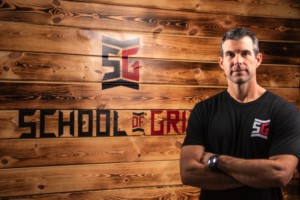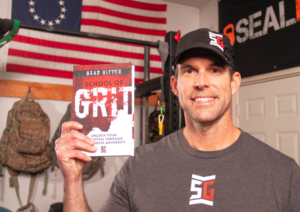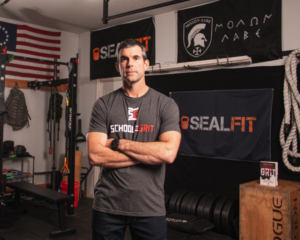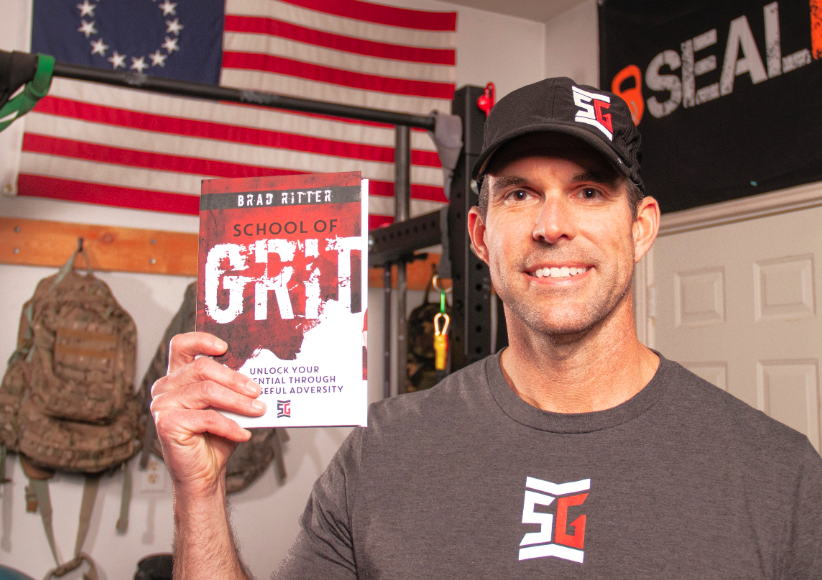Business Spotlight: School of Grit
Writer / Christy Heitger-Ewing
Photography / Canaan Sellers
 It may sound strange, but Brad Ritter is a big proponent of doing something that sucks every day. Why? Because it forces you to step outside of your comfort zone, which, in turn, promotes self-growth.
It may sound strange, but Brad Ritter is a big proponent of doing something that sucks every day. Why? Because it forces you to step outside of your comfort zone, which, in turn, promotes self-growth.
He hasnt always felt this way. He used to work at a corporate job, and by societys standards, led a rather cushy lifestyle. Then, one day in 2013, when he was in his early 30s, he has what he calls a man in the mirror moment when he questioned whether he was living up to his God-given purpose. He began searching the internet for guidance when he came across a TED Talk by Angela Duckworth called Grit: The Power of Passion and Perseverance, which changed his life. Research shows that grit is a leading predictor of success in life. Curious to learn how gritty he was, Ritter took Duckworths quiz and was irked to score 2.2 out of 5 on the grit scale. That was good enough to be grittier than 20% of Americans who took the quiz, but not good enough for Ritter.
I thought, that cant be right. Im tough! Ritter says. Then I looked back at the questions and realized it was spot on. Up to that point, Id start something but not finish it.
Determined to grow his grit, Ritter enrolled in SEALFits Kokoro Camp, which is modeled after Navy SEAL Hell Week. The camp is considered the most powerful and challenging training available to civilians in the world physically, mentally, and emotionally. Its designed to break you down, expose your weaknesses, then build you back up.
I felt in my bones that I needed to go to this camp, says Ritter, who told his wife, Leslie, that she wouldnt hear from him while he was away. I had the mindset that I was coming home with my shield on because I was not going to give up.
 Kokoro Camp is over 50 hours of continuous physical movement with no sleep and very little food. It pushes participants to and past their limits physically, mentally and emotionally. Ritter, 35 at the time, was nicknamed Gramps by the others. Despite being the oldest participant, he secured the crucible. Of the 50 who started the program, only half graduated.
Kokoro Camp is over 50 hours of continuous physical movement with no sleep and very little food. It pushes participants to and past their limits physically, mentally and emotionally. Ritter, 35 at the time, was nicknamed Gramps by the others. Despite being the oldest participant, he secured the crucible. Of the 50 who started the program, only half graduated.
After that experience, I was reborn. Ritter, version 2.0, he says. Up until that point, Id never really been tested. I guess you could say that I met myself for the first time.
People in his sphere noticed the change and commented that something was different about him.
Indeed there was and it was a transformation he wanted to share with others. One of the things he learned at Kokoro Camp is that we cant make it through life without working as a team. Even when we feel we cant take another step, by helping others, we, in turn, help ourselves.
Ritter wanted to find a way to replicate that attitude in the real world, so he became certified as an Unbeatable Mind coach. He also wrote School of Grit: Unlock Your Potential Through Purposeful Adversity, which became an Amazon bestselling book. Then, in January 2022, he launched School of Grit, an online program for men and women of any age, at any stage of life. Although people from all walks of life can join, it generally attracts those between 30 and 65 who live a more active lifestyle.
They like to work out, be part of a team, serve others, and have a growth mindset, says Ritter, who is now 43. Theyre looking to be the best version of themselves so theyre open to trying new things.
Members enroll in School of Grit and Ritter gives a free 30-day trial. Its run like a school in that Ritter presents a class schedule at the beginning of each month. He enlists the help of guest coaches and speakers who talk to the group every month. Ritter also teaches 90 minute workouts on Saturday mornings from his garage gym. In addition, he incorporates four to five crucible-style experiences a year. These represent quarterly tests for the community. For instance, they might do a 4x4x48, which involves running four miles every four hours for 48 hours. They also do an annual long walk during which they walk for 24 hours with mini breaks.
Doing these things tests your body and also tests your mind, Ritter says. You want to quit, but persevering is how you grow.
Ritter has found that with online coaching, people are more willing to open up.
You wouldnt believe how quickly a persons guard goes down when youre online and its just a camera, says Ritter, who has heard it all divorce, bankruptcy, drugs and other addictions, and more. Ritter appreciates the authenticity. I want people to be real, he says.
What we teach here is a lifestyle, and its not just the physical area we train, we go deep into the other areas like mental toughness and emotional resiliency. We even touch on spiritual. Nothing is out of bounds. Its really about training the whole person. All of my coaches are hand selected and we eat our own dog food. We wont teach something that we havent experienced ourselves.
 We have members from New York to California and everywhere in between. My dream is to bring this training class to my own backyard and local community; to host live events locally. We can get a lot done virtually, but together in person is where the biggest transformations can occur.
We have members from New York to California and everywhere in between. My dream is to bring this training class to my own backyard and local community; to host live events locally. We can get a lot done virtually, but together in person is where the biggest transformations can occur.
Ritter is developing what he calls a warrior class.
Everyone has a warrior in them, he says. Thats the ability to take care of yourself, take care of others and tap into your full potential. Its realizing your God-given purpose and going after it.
He notes that warriors are not afraid to fail. In fact, they look to lean into a bit of discomfort. This is where the idea of doing something everyday that sucks comes into play.
Weve gotten too soft in society, says Ritter. This is the most comfortable generation that has ever existed. We need to get back to the joy of hard work.
While its human nature to fear making mistakes, the truth is that failure is the greatest teacher. When Ritters children, Hallie, 12, and Brody, 9, are at the dinner table, he doesnt ask them how their days was. Instead, he poses the question, What did you fail at today?
If youre not failing, youre not learning, he says.
If youre looking to discover your passion, purpose and potential, check out Ritters School of Grit. Visit www.schoolofgrit.org. Or, find him on social media at www.facebook.com/SchoolofGrit or www.instagram.com/schoolofgrit_bradritter/.





